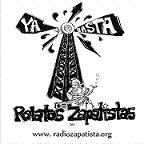Radio Autonomía: Zapatismo in the Bay — JUNE 2012 SHOW
Radio Autonomía: Zapatismo in the Bay — JUNE 2012 SHOW
AUDIOS from the June 3, 2012 broadcast of Radio Autonomía: Zapatismo in the Bay (formerly Relatos Zapatistas) on Berkeley Liberation Radio, 104.1FM, livestream at www.berkeleyliberationradio.net
1. Durito Storytime: The Story of the Seven Rainbows
(Descarga aquí)
2. Report from Infinite Solidarity with Montreal March
(Descarga aquí)
3. Interview with Lobna (Egypt) & Gemma (OO Antirepression Crew)
(Descarga aquí)
4. Interview with Mariana Mora & Guiomar Rovira (Mexico)
(Descarga aquí)
5. Entrevista con Mariana Mora y Guiomar Rovira (México)
(Descarga aquí)
We want to announce that we’re changing the name of our show from Relatos Zapatistas to Radio Autonomía: Zapatismo in the Bay to reflect the increasingly local focus of our reporting on anticapitalist and autonomous politics.
In the coming we’ll be filling this site with our complete archives.
SOLIDARITY IN AN AGE OF GLOBAL INSURRECTION
2011 was marked by unprecedented mobilization and insurrection around the world. From Tunisia to Spain, Egypt to Greece, the UK to Syria, Chile to Quebec, New York to Oakland, popular movements emerged and mutated into revolutions that rippled across and resonated throughout the world. Common tactics and organizing formations appeared as well, from the general assemblies of the so-called “movement of squares” to the tent encampments of the occupy movement in the US. One way to understand these resonances is as a sign that, despite significant differences, these varied sites of struggle also share important commonalities: the encroachment of the crippling austerity of late capitalism, the increasing violence and impunity of the police, the shared recognition that the state is incapable of resolving our problems. In short, we are all touched in some way by the everyday operations of an accelerating capitalism in crisis.
As a Zapatista-inspired collective in the Bay Area, we have been thinking about solidarity for many years. In 2003, for example, the Zapatistas confronted a solidarity problem. Subcomandante Marcos wrote of the “sophisticated charity” of NGOs and civil society in the global north, which arrived in the Zapatista communities with their own projects and timetables — and frequently without even consulting the communities. In response, the Zapatistas established the Juntas de Buen Gobierno to mediate between international civil society and the autonomous communities and to regain control of their own communities back from what they saw as the “imperialism” of NGOs. At the same time, it was an attempt to redirect the focus of activists from the North back onto themselves. The Zapatistas pushed the international community to think of solidarity in a more radical way, proposing a new type of international solidarity that didn’t name, define or represent their struggle rather it wanted to generate what Gustavo Esteva calls “the International of hope: a web constituted by innumerable differentiated autonomies, without a center of hierarchies, within which the most varied coalitions of discontents can express themselves, to dismantle forces and regimes oppressing all of them”. In Zapatismo, spaces and practices of listening and encounter have been effective for imagining and building new relations of solidarity.
This leads us to two possible models of solidarity. The first model is characterized by the “charity” work that Marcos critiques which is based on an identification of difference: activists in the global north see themselves as privileged and want to help out the poor, disadvantaged, helpless “Indians” in the jungles of southeastern Mexico. The second model, on the other hand, does not deny difference but emerges from a recognition of commonalities. In this age of global insurrection, anticapitalist and antiauthoritarian actors around the world are part of a common struggle and recognize themselves as such, as dialogues emerge and inspiration circulates globally.
In today’s show, we want to think through the relations of solidarity that emerge between different sites of struggle. Specifically we want to think about forms and practices of solidarity across space, distance, borders, and walls, both physical and symbolic. We will hear three interviews dealing with three sites of struggle and solidarity. Speaking with activists from Egypt and Mexico on one hand, will emphasize solidarity across geographic distance, while on the other hand perspectives from Oakland about the prison archipelago highlights solidarity across institutional distance. We are interested in the following questions about the meanings, language, and media of solidarity: How is solidarity different than other forms of “care” such as “charity”? What kinds of practices make up a radical, revolutionary, transversal solidarity? What is the relationship between language and solidarity; for example, how does a solidarity statement work and how does it move? What does solidarity look like today, at a time when insurrection is becoming increasingly generalized?


